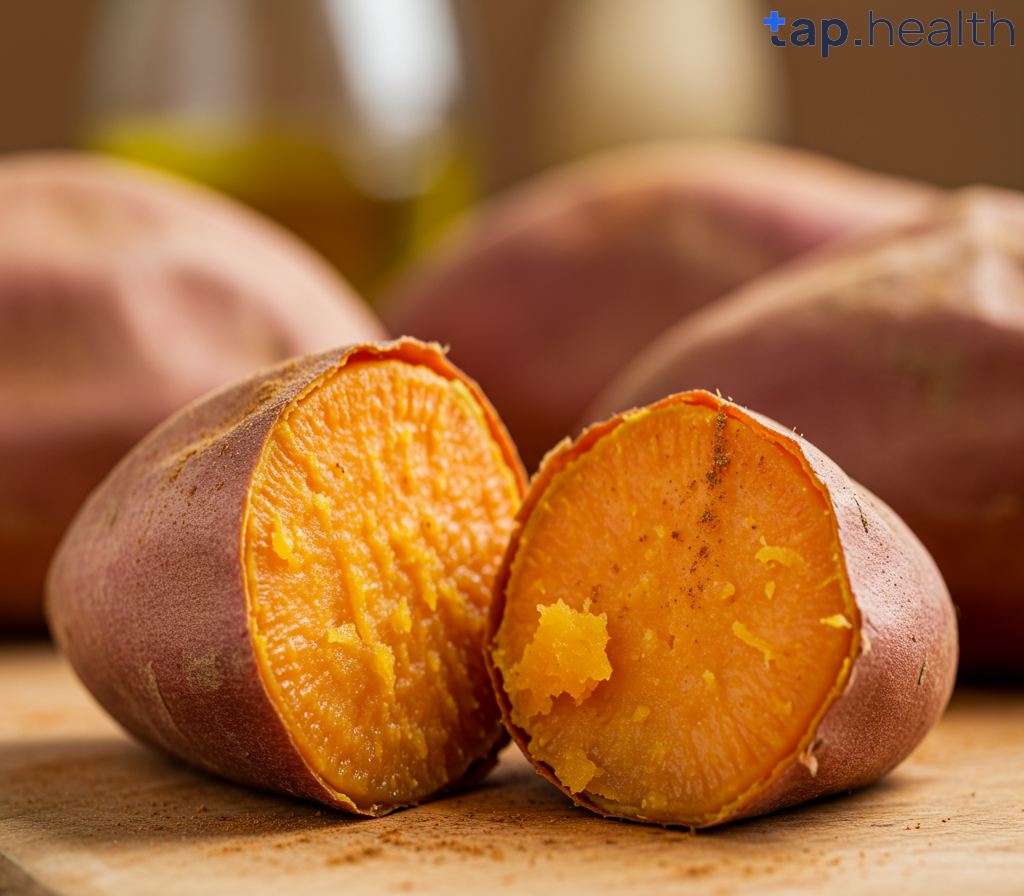Sweet potatoes are a nutritious and versatile root vegetable, commonly used in many dishes for their sweetness and health benefits. For people managing diabetes, choosing foods that help regulate blood sugar is important. So, is sweet potato a good food for diabetic patients? In this article, we will explore the nutritional benefits of sweet potatoes, how they affect blood sugar levels, and how they can be incorporated into a diabetes-friendly diet.
Nutritional Benefits of Sweet Potato
Sweet potatoes are rich in vitamins, minerals, and fiber, offering many health benefits. A 100-gram serving of cooked, boiled sweet potato contains:
- Calories: 86
- Carbohydrates: 20.1 grams
- Fiber: 3.3 grams
- Vitamin A: 709 µg (about 141% of the daily recommended intake)
- Vitamin C: 2.4 mg (about 4% of the daily recommended intake)
- Potassium: 337 mg
- Folate: 11 µg
Sweet potatoes are an excellent source of vitamin A, which supports immune function and eye health. They are also rich in fiber, which helps regulate blood sugar levels, and potassium, which is beneficial for heart health. Additionally, the high antioxidant content in sweet potatoes helps reduce inflammation and oxidative stress.
How Sweet Potato Affects Blood Sugar Levels
For diabetics, it is important to focus on foods that help manage blood sugar levels. The glycemic index (GI) and glycemic load (GL) of foods play a significant role in determining their impact on blood sugar.
Glycemic Index and Glycemic Load of Sweet Potato
The glycemic index (GI) of sweet potatoes is low to moderate, depending on how they are cooked. Boiled sweet potatoes have a GI of around 44–61, which is lower than that of white potatoes but still higher than that of non-starchy vegetables. Foods with a low to moderate GI are digested and absorbed more slowly, leading to a gradual increase in blood sugar, which is beneficial for diabetics. The glycemic load (GL) of sweet potatoes is moderate, which means they have a moderate impact on blood glucose levels when eaten in proper portion sizes.
Sweet potatoes’ fiber content also helps slow glucose absorption, further promoting blood sugar regulation.
Sweet Potatoes and Insulin Sensitivity
Insulin sensitivity is essential for people with Type 2 diabetes. Insulin resistance, a condition where the body’s cells do not respond properly to insulin, leads to elevated blood sugar levels.
Antioxidants in Sweet Potatoes for Insulin Sensitivity
Sweet potatoes contain antioxidants like beta-carotene (which is converted to vitamin A) and vitamin C, which have been shown to reduce oxidative stress and inflammation. Chronic inflammation is associated with insulin resistance, and reducing inflammation may help improve insulin sensitivity over time. Including sweet potatoes in your diet may help support better blood sugar control by improving insulin function.
Sweet Potatoes and Heart Health
Diabetics are at a higher risk for cardiovascular diseases, so heart health is a major concern. Sweet potatoes contain several nutrients that support cardiovascular health.
Potassium for Blood Pressure Regulation
Sweet potatoes are a good source of potassium, which is important for maintaining healthy blood pressure. Potassium helps balance sodium levels in the body, supporting proper heart function. Since high blood pressure is common in people with diabetes, consuming potassium-rich foods like sweet potatoes can help regulate blood pressure and reduce the risk of heart disease.
Fiber for Cholesterol Management
The fiber in sweet potatoes helps reduce bad cholesterol (LDL) levels by binding to cholesterol and assisting with its removal from the body. Lowering cholesterol is beneficial for heart health, especially for diabetics who are at higher risk for cardiovascular complications.
Sweet Potatoes and Weight Management
Maintaining a healthy weight is crucial for managing diabetes, as excess weight contributes to insulin resistance and poor blood sugar control.
Sweet Potatoes for Satiety and Portion Control
Sweet potatoes are high in fiber and complex carbohydrates, making them a filling food that promotes satiety. The fiber helps keep you feeling full for longer, which can reduce the likelihood of overeating. By including sweet potatoes in meals, diabetics can manage portion sizes and support healthy weight management, an important factor in diabetes control.
How to Include Sweet Potatoes in a Diabetic Diet
Sweet potatoes are versatile and can be included in various meals. Here are some ideas for incorporating sweet potatoes into your diabetes-friendly diet:
In Stews and Soups
Sweet potatoes can be added to soups, stews, or curries, providing both flavor and nutrition. They pair well with other vegetables and lean proteins to create hearty, blood-sugar-friendly meals.
Roasted or Baked
Roasted or baked sweet potatoes can be served as a side dish or mashed with a small amount of olive oil, garlic, and herbs for added flavor. This preparation method helps retain their nutritional value and supports stable blood sugar levels.
In Salads
Cooked sweet potatoes can be cubed and added to salads, paired with leafy greens and other non-starchy vegetables for a nutritious, blood-sugar-friendly meal.
In Smoothies
Sweet potatoes can be blended into smoothies for added texture and nutrients. Combine cooked sweet potato with a handful of spinach, unsweetened almond milk, and some cinnamon for a nutritious and satisfying smoothie.
FAQ on Sweet Potatoes and Diabetes
Q1: Are sweet potatoes safe for diabetics to eat?
Yes, sweet potatoes are safe for diabetics to eat. They have a moderate glycemic index and are rich in fiber, vitamins, and minerals that help regulate blood sugar levels and promote overall health.
Q2: How much sweet potato can diabetics eat?
A standard serving of sweet potatoes is about 1/2 cup of cooked sweet potato. Since they have a moderate glycemic load, it’s important to consume them in proper portion sizes to prevent a significant rise in blood sugar levels.
Q3: Do sweet potatoes raise blood sugar levels?
Sweet potatoes have a moderate glycemic index, meaning they can cause a gradual increase in blood sugar levels. However, their high fiber content helps slow glucose absorption, which helps minimize spikes in blood sugar.
Q4: Can sweet potatoes help lower blood sugar levels?
While sweet potatoes do not directly lower blood sugar levels, their high fiber content and moderate glycemic index help regulate blood sugar and improve insulin sensitivity over time.
Q5: Can sweet potatoes help with weight loss for diabetics?
Yes, sweet potatoes are low in calories and high in fiber, making them a great choice for weight management. The fiber promotes satiety, helping reduce overeating and supporting healthy weight loss for diabetics.
Conclusion
Sweet potatoes are a nutrient-rich, low-calorie food that offers several benefits for diabetics. With their moderate glycemic index, high fiber content, and abundance of vitamins and antioxidants, sweet potatoes help regulate blood sugar levels, improve insulin sensitivity, support heart health, and assist with weight management. By including sweet potatoes in your meals, you can enjoy their many health benefits while effectively managing your diabetes.



